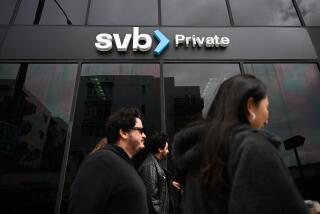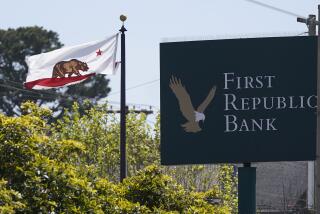Banks Will Turn Up the Volume on Y2K Readiness
- Share via
At the stroke of midnight on New Year’s Eve, few industries are expected to fare as well as banks. Federal regulators say 98% of all banks already have done the work necessary to avoid year 2000 computer problems, and they are confident the rest will be ready by Dec. 31.
But in a striking contrast, bank customers are not so sure. A recent Gallup poll found that 42% of consumers expect automated teller machines to malfunction and 38% fear checks will bounce. One in five people fear that Y2K will shut down the entire banking system.
The conclusion of bank regulators and industry experts? Banks have a good story to tell, but they aren’t getting their message across.
“Even though banks may have been making an effort, they have to do more to make sure they are conveying their message,” said Donna Tanoue, chairwoman of the Federal Deposit InsuranceCorp., which regulates most U.S banks.
For the last year, banks have relied heavily on “statement stuffers” to inform their customers about Y2K progress, but it appears people haven’t read them. Nearly 75% of consumers said in the March survey that they hadn’t received any Y2K information from their banks, a surprisingly high figure considering that regulators began pressing banks to launch their Y2K communication efforts more than a year ago.
Now regulators are urging banks to be more proactive by hosting community seminars on Y2K preparedness, sending customers a separate letter from the bank president and training tellers to broach the issue with customers in branches.
“Between now and the end of the year, you are going to see a lot more communication,” said Charlotte Birch, a spokeswoman for the American Bankers Assn.
Union Bank of California began running ads last week in the state’s major newspapers, declaring that the San Francisco-based bank is “Y2K OK.” That slogan also will soon appear on bank statements, envelopes, ATMs and in branch displays. Some of Union’s business customers will receive personal letters, and tellers recently began handing out Y2K brochures to every branch visitor.
The message Union wants to deliver: business as usual.
“The greatest risk we face at the end of the year isn’t with our systems not working properly,” said Lee Kirkpatrick, senior vice president at Union. “The risk is that people will behave abnormally. That’s what will cause the system to have problems.”
At Sanwa Bank California, officials spent $25,000 to produce a Y2K video, which it hopes will be used by local television stations. The Los Angeles-based bank also is sending its executives to speak at Rotary Club meetings and on cable access shows. Tellers, meanwhile, will soon be sporting Y2K buttons and pins designed to stimulate discussion.
Similar marketing efforts are underway across the country. Wachovia Bank recently began running radio spots in Washington. In Oklahoma, roadside billboards with the slogan “Nothing’s safer than money in the bank” are going up this month, courtesy of the Oklahoma Bankers Assn. A couple of East Coast banks have announced plans to stay open on New Year’s Day to assure depositors that all is well. So far, no California banks have announced similar plans.
Bank officials concede that the industry got a late start in marketing their YK2 message. But until banks passed the June 30 Fed-imposed deadline for demonstrating that their key computer systems are ready for Y2K, the most banks could tell their customers was, “We’re working on it.”
“That’s not the kind of message that institutions wanted to spend money to send,” said John Stafford, spokesman for the California Bankers Assn. Now that most institutions have received their “satisfactory” rating from regulators, Stafford expects to see more aggressive marketing.
Fear of lawsuits also has forced banks to move slowly. Mindful of the wave of Y2K litigation already clogging the courts, some banks worry that their marketing promises could come back to haunt them if computer problems arise.
“The problem in California is that it seems one in five people is an attorney,” said Wayne Socha, a senior project vice president at Sanwa Bank. “So everything has to go through legal [experts] to make sure it’s framed carefully.”
An example of the legal maneuvering is apparent on Wachovia Bank’s Web site, which declares simply: “We are ready.” But then below the message, the bank can’t help including several paragraphs of legal fine print, including the seemingly contradictory statement that the bank’s previous message “should not be interpreted as a specific representation or warranty by Wachovia Corp. and its affiliates with respect to its year 2000 readiness.”
Finally, some banks have been purposely delaying their Y2K marketing efforts until the Dec. 31 deadline draws nearer, just as politicians wait until the final weeks of an election to unleash their television ads.
“We think the concern level will go up in September through December,” Socha said. “That’s when there will be more doom and gloom. And that’s when we plan to put more of our message out.”
While some banks are experimenting with radio and newspaper ads, most expect to spend far less on Y2K marketing than they would, for example, to promote a new credit card or other product. Marketing experts say a grass-roots campaign involving pamphlets and mailers is not only cheaper, it’s more effective.
“The most important thing is to reassure the bank’s own customer base, and that’s most effectively done through direct communication,” said Carole Hassell, a senior vice president at Ketchum Inc., a New York public relations firm hired by Bank of America to help develop a Y2K communications strategy.
Though bank marketing tactics have become increasingly aggressive in California--sometimes taking shots at a rival’s prices or customer service--so far none of the state’s institutions has attempted to use their Y2K readiness as a competitive advantage.
“Banks realize that trashing the competition tends to run down the public perception of the whole industry,” Stafford said.
In fact, banks in California and elsewhere have been unusually cooperative on the Y2K issue. For example, in San Diego County, 14 community banks are joining forces to launch a print ad campaign highlighting their Y2K efforts.
“It’s not that often that you see banks cooperate on advertising,” said the ABA’s Birch. “Or on anything for that matter.”
The Times’ advertising and marketing news staff can be reached at adbiz@latimes.com or (213) 237-3341.
WALL ST. READY?: SEC spells out Y2K rules for brokerages. C4
(BEGIN TEXT OF INFOBOX / INFOGRAPHIC)
Is the Message Getting Through?
Though federal regulators say 98% of banks are on track to avoid year 2000 disruption, customers are bracing for widespread problems. Here are results of a survey on whether people had received Y2K information from their bank:
Yes: 23%
No: 75%
Don’t Know: 2%
Source: The Gallup Organization
Perception vs. Reality
A recent survey shows that bank customers are bracing for Y2K problems, including malfunctioning ATMs, bounced checks and even banking system failures. Regulators and industry experts say the March survey--highlighted below--shows that banks need to step up their Y2K marketing efforts.
I believe it’s certain or probable that because of Y2K:
People will panic and withdraw all funds: 47%
People will temporarily lose access to cash: 44%
ATMs won’t work: 42%
Checks will bounce: 38%
Banks will lose track of people’s money: 29%
The banking system will shut down: 22%
People will access others’ accounts: 17%
*
In response to Y2K, I definitely or probably will:
Confirm bank balances: 86%
Maintain usual banking routine: 82%
Keep better track of transactions: 78%
Withdraw some extra cash: 62%
Discuss Y2K readiness with bank: 59%
Temporarily stop direct deposit: 19%
Transfer deposits to Y2K-ready bank: 17%
Withdraw all deposits: 14%
Pull funds out of other accounts: 12%
More to Read
Inside the business of entertainment
The Wide Shot brings you news, analysis and insights on everything from streaming wars to production — and what it all means for the future.
You may occasionally receive promotional content from the Los Angeles Times.










